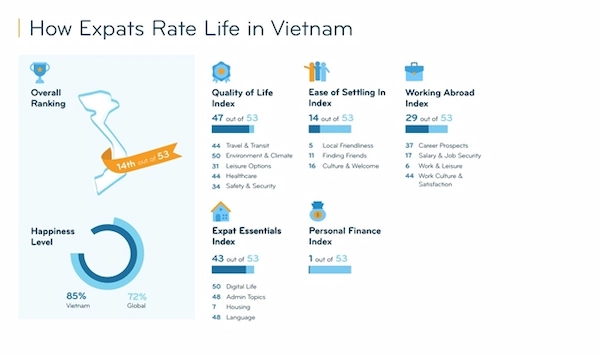Tips for Negotiating an Expat Package in Vietnam
Are you considering a move to Vietnam for work? If so, you’ll want to make sure you negotiate the best possible expat package. While Vietnam is an exciting and dynamic place to live and work, it’s important to ensure your compensation and benefits are fair and meet your needs.
Let’s dive into some key tips for successfully negotiating your expat package in Vietnam:
Research the Cost of Living

Before you start negotiating, it’s crucial to research the cost of living in Vietnam, especially in the city where you’ll be based. While Vietnam is generally an affordable place to live, costs can vary significantly between smaller cities and major hubs like Ho Chi Minh City and Hanoi.
Housing will likely be your largest expense as an expat. Costs can range from around $500 per month for a basic apartment in a smaller city to upwards of $2,000 or more for a luxury place in the heart of Saigon or Hanoi. Be sure to factor in utilities, internet, and any building/facility fees as well.
The good news is that other living costs like food, transportation, and entertainment are relatively inexpensive in Vietnam compared to Western countries. This allows expat budgets to stretch much further. Still, it’s wise to do some online research and budgeting to determine what salary and housing allowance you’ll need to maintain your desired standard of living.
Understand the Components of an Expat Package

An expat package in Vietnam typically includes more than just your base salary. Most also provide benefits and allowances like:
- Housing allowance
- International health insurance
- Annual flights back to your home country
- Shipping and relocation costs
- Transportation allowance
- Education allowance for children
When negotiating, don’t just focus on the base salary – the benefits and allowances are often where companies have the most flexibility. For example, if they can’t budge on salary, perhaps you can negotiate a higher housing allowance or more frequent flights home.
Also be sure to clarify any tax liabilities, both in Vietnam and your home country. Vietnam’s tax system can be complex, so understanding what you’ll owe is key to determining your actual net income. Some companies cover Vietnamese taxes for expat employees.
Know Your Value and Priorities

As you prepare to negotiate, reflect on the unique value you bring to the table. What skills, experience, industry knowledge, or regional expertise do you have that sets you apart? The more essential and in-demand your capabilities, the stronger your negotiating position.
Also consider what’s most important to you professionally and personally. Are you focused on landing a challenging role that advances your career? Do you want to take on more leadership?
On the lifestyle front, is work-life balance a top priority, or the ability to travel around the region? If you have a family, your priorities might include an international school allowance, housing with child-friendly amenities, or a location with clean air and green space.
Getting clear on your own value-add and priorities helps you advocate for a package that meets your specific needs. It also gives you clarity on where you’re willing to make trade-offs if needed.
Time it Right
Choosing the right time to negotiate is key. Ideally, you want to wait until after you receive a verbal job offer but before signing the formal contract. This signals to the employer that you’re seriously considering the role, but still gives you leverage to shape the package.
Come prepared with market data, a clear understanding of your needs, and ideas for making it a win-win. The more reasonable and well-researched your requests, and the better you can back them up, the more likely you are to get a positive response.
If the initial offer meets your needs, you may choose not to negotiate much. But if the salary or benefits seem low, don’t be afraid to ask for what you deserve. Just be sure to communicate professionally and clearly explain your rationale.
Be Prepared to Negotiate More Than Once

Rarely does an expat package get finalized in a single conversation. Often, it requires a bit of back-and-forth. After making your requests, the employer may agree to some, deny others, and possibly make some counter-offers.
For example, if you ask for a higher base salary and housing allowance, they may agree to a moderate salary increase but not budge on housing. Or they may offer an alternative like a one-time relocation bonus or additional flights home in lieu of a salary increase.
Consider the compromises carefully in light of your priorities. Getting hung up on a single sticking point could mean losing out on an otherwise great opportunity. Be open-minded and focus on the total value of the package.
Don’t Forget About Quality of Life

While compensation and benefits are important, don’t underestimate the value of quality of life factors like cultural fit, housing location, proximity to amenities, air quality, social opportunities, and travel options. These can hugely impact your overall happiness and success as an expat.
For example, if you thrive on social interaction, a housing allowance that enables you to live in the heart of a vibrant district might be more valuable than a slightly higher salary that only gets you a place in the suburbs. If you have kids, easy access to international schools and children’s activities may be a priority.
Also consider practical matters like the convenience and reliability of public transportation near your office and home, access to healthcare that meets your needs, and the availability of goods and services that are important to you.
Basically, think beyond just the financials and advocate for a package and circumstances that set you up to thrive in your new environment.
Get Everything in Writing

Once you’ve verbally agreed on the key components of your expat package, be sure to get everything in writing. Insist on a clear, thorough contract that details the salary, benefits, and allowances you’ve agreed upon.
While your new employer may be completely trustworthy, verbal promises are not legally binding. Having everything properly documented protects both parties and ensures there are no misunderstandings down the line.
Review the contract carefully to make sure everything is correct before signing on the dotted line. Don’t hesitate to ask for clarification or to request changes if needed.
Conclusion
Negotiating an expat package in Vietnam is both an art and a science. By doing your research, understanding your value, clarifying your priorities, and negotiating respectfully and strategically, you position yourself to secure a package that meets your needs.
Remember, your happiness and success as an expat depends on more than just the financials. Prioritize quality of life factors that enable you to thrive in your new surroundings.
Once you’ve reached an agreement, protect yourself by ensuring all details are captured in a written contract. Then, get ready to embrace the adventure and opportunities that await you in Vietnam!
Are you looking for help building a beautiful tempered glass roof for your home or business in Vietnam? Contact Jobinvietnam.net today! Our experienced team specializes in the design and construction of stunning, durable tempered glass roofs. Call or Zalo us for a free consultation and estimate. Let us help you bring your vision to life!

